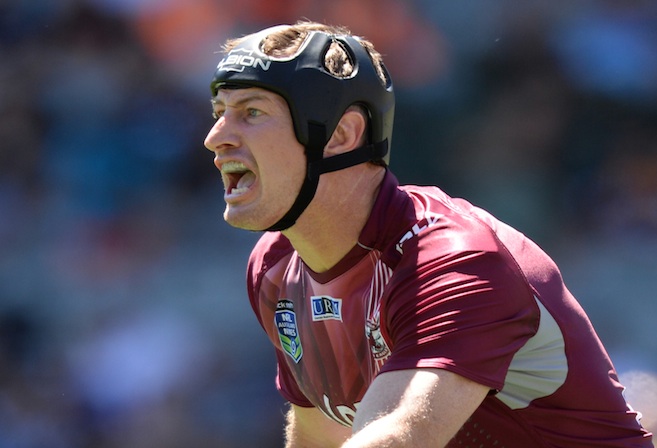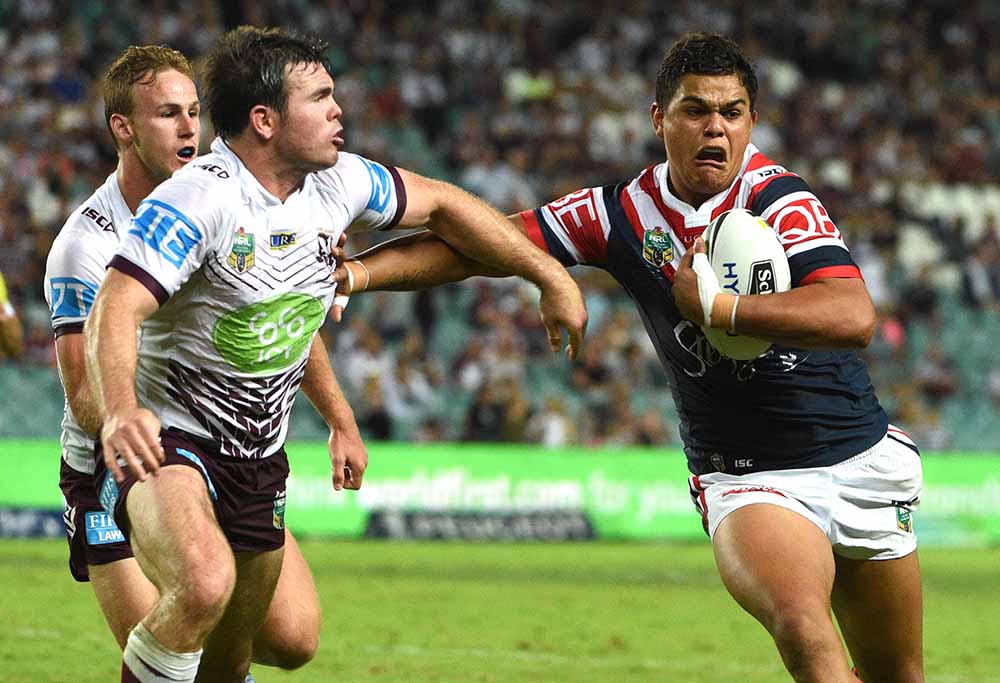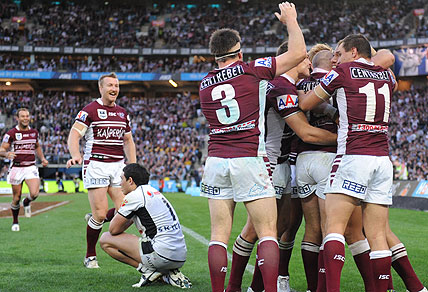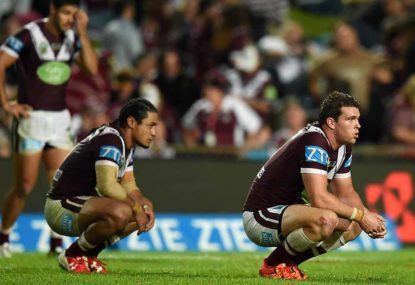Few teams have experienced such a marked generational shift as Manly over the last half decade.
Between the arrival of Daly Cherry-Evans in 2011, Jake Trbojevic in 2013 and Tom Trbojevic in 2015, the old guard have been steadily consigned to the past.
2015, in particular, felt like a bit of a watershed year, with Glenn Stewart departing for the Bunnies and Brett Stewart’s knee injuries starting to seriously take their toll.
At their height, no players epitomised the spirit of the 2008 and 2011 grand finalists like the Stewart brothers. When they were playing well, Manly’s fate seemed assured.
To see them split up was schismatic enough, but to see them replaced by another pair of brothers – a fullback and a forward no less – in the very year that Glenn joined the Rabbitohs was the writing on the wall.
With Brett Stewart and Steve Matai now seeking medical retirement, it feels as if one of the greatest recent footy generations has finally come to an end.
Growing up in the 2000s, no team seemed quite as untouchable as Manly.
Granted, there were teams that were more brutally professional, like the late 00s Storm, as well as teams that seemed capable of bringing in more inspired victories, like the early 00s Bulldogs.
But nobody seemed to gel and sync as a team like the Sea Eagles.
Nobody has given the Storm such a categorical thrashing during the Cam Smith, Billy Slater and Cooper Cronk era as the 40-0 takedown that won Manly the 2008 grand final.
With Steve Menzies on the bench and the Stewart brothers putting in the hard yards, it was the perfect changing of the guard.

It wasn’t just the Stewarts however, but a whole rising generation of players – Steve Matai, David Williams, Matt Ballin, Anthony Watmough – who suddenly seemed the face of the Brookvale future.
In the wake of those kinds of victories, it’s not uncommon for players to switch clubs.
With the prestige of a grand final win comes a new kind of market value, and it can be difficult for clubs to retain every one of the players that got them to that glorious moment.
Even when a club does retain their players, it’s nearly impossible to recreate the same spirit and synergy over the subsequent season, especially in a code like the NRL that has such long seasons and such continual player movement.
Yet the Sea Eagles managed to win another grand final a mere three years later, with the same core in place – the Stewart brothers, Matai, Williams, Ballin, Watmough – plus a couple of fresh faces in Tony Williams, Will Hopoate and Kieran Foran. Only David Williams was missing from action with a neck injury.
In retrospect, this feels like the last decisive gesture of the old generation, with Cherry-Evans going try for try with the Stewarts to stamp his burgeoning signature on the match.
From thereon, the balance of power at Brookvale started to shift a bit, but between 2008 and 2011 it felt as if Manly had mastered the art of maintaining momentum.
In the modern era, only Brisbane and Melbourne have managed such rapid turnarounds with grand final wins.
Unlike Brisbane and Melbourne, however, the key to Manly’s success has seemed to inhere in the broad cross-section of the team, rather than a few prestigious playmakers.
Incredibly, all these playmakers felt as if they might become one-team players in the wake of the 2008 grand final.
Certainly no other team in the NRL, with the exception of the Wests Tigers, has felt so defined as a one-player team over the last decade and a half.
At its peak, around 2010-2011, Manly felt more like a small town country team than a city team, in keeping with its massive catchment area and comparative isolation from the rest of Sydney.
Critics called the Sea Eagles parochial, but perhaps that was their greatest strength.

Certainly, it made sense that Manly were Tony Abbott’s team, just as it makes sense that the Roosters are Malcolm Turnbull’s.
Where Turnbull tends to appeal to an inner city Liberal demographic, Abbott’s policies often felt as if they were hearkening back to a version of Australia founded on small-town community.
Whenever players from the Sea Eagles were fielded to Country Origin, that sense of Manly as a rural outfit felt particularly tangible and compelling.
If Stewart was the soul of that community, then Steve Matai was the heart.
Few men in the NRL over the last decade have been harder than Matai at his hardest, and even fewer have carried it through with such good humour.
A centre who played like a prop, he combined brains and brawn in equal measure.
In the contemporary game, there often seems to be a perception that being a hard man on the field means cultivating a gangsta persona.
While we mightn’t doubt the talent of Jared Waerea-Hargreaves or Marty Taupau or Ryan James it’d be hard to say that they exude much of a sense of humour.
In that sense, Matai often reminds me of Josh Reynolds, or an older version of Billy Slater, back before his niggling hadn’t been subsumed into the professionalism of his later career.
Indeed, at one point it often felt as if Matai and Slater were paired as something of an odd couple by the media at large, culminating with their spectacular clash during the buildup 2011 grand final.
Of course, there were other great players during those heady Manly days. But what sets both Stewart and Matai apart is their staying-power.
After the 2011 victory, it genuinely felt as if every core Manly player might stick around, perhaps even win another grand final in the next couple of years.
It was a shock, then, to see such a rapid string of departures, not least because of how anticlimactic or acrimonious some of those departures have turned out to be.
Kieran Foran is obviously the most dramatic example, having moved to the Eels only to be released in the midst of mental health issues and allegations relating to his conduct at the Sea Eagles.

But Matt Ballin found himself in a pretty unenviable position as backup hooker to Robbie Farah, even before injury ruled him out of the 2016 season, while Watmough probably never expected to end his career as collateral damage for yet another Eels financial crisis.
Tony Williams, too, has put in a pretty quiet couple of years at the Dogs and the Sharks, while Hoppa never quite came into his own at Parra and now has religious obligations that prevent him giving his all to Canterbury-Bankstown, at least in terms of game time.
From one of the greatest rugby league communities in the country, the late great generation of Sea Eagles players have become a diaspora, a collection of ex-Manly greats that pop up in the strangest and most unexpected places.
There’s something moving, then, about seeing Stewart and Matai seek medical retirement clearance.
With Jamie Lyon having retired, these two men are the last stalwarts of what once felt like a stable of one-club players. Hard as nails, they’ve played for Manly until they have literally nothing left to give.
Even in the midst of the salary cap dramas and ongoing investigations into Manly’s financial arrangement, you have to hope that these guys get a chance to go out with dignity.
Stewart, in particular, still feels like the Prince of Brookvale, even if Tom Turbo surpassed him at No.1 some time ago.
Sure, he may be a flawed prince, or a demoted prince, but he still represents Manly in a way no other current player can. That kind of gravitas only comes from giving your entire life to a club.
With Brookvale set to change its name to Lottoland – surely one of the most unfortunate rebrandings in recent times – Stewart’s gravity seems even more pronounced.
Prince of Lottoland doesn’t quite have the same ring to it as Prince of Brookvale.
As the Trbojevics come into their own, let’s hope that Stewart has a chance to go out with style.
Of course, there will be some fans who always hate Manly – that seems to go deep.
Yet I wonder if that hatred is partly fuelled by awe at what they managed to achieve between 2009 and 2011.
For my money, that level of team spirit and commitment is unmatched by any NRL outfit since the Super League War.
In an era when the game seems more and more driven by market values and personal gain, the Sea Eagles briefly offered us a throwback to a different era.
Watching Stewart and Matai bow out is therefore doubly nostalgic and doubly poignant. Boys, thanks for a great decade of footy.
































































































